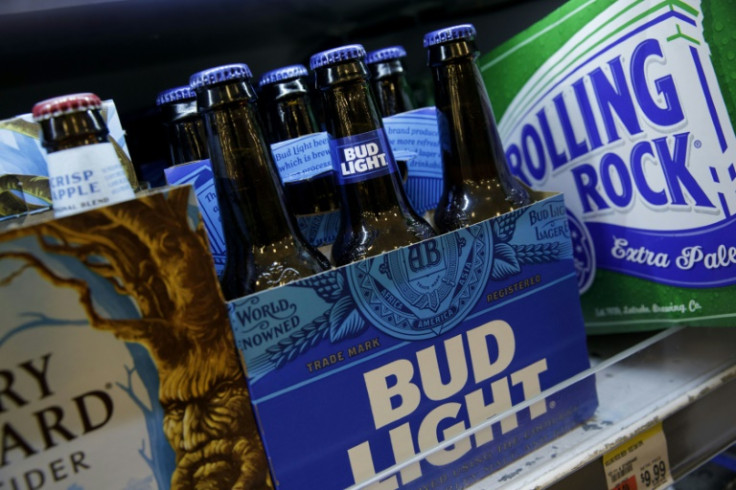Bud Light Sees 17% Drop In Sales Amid Calls Of Boycott Over Dylan Mulvaney Controversy
Bud Light has reportedly suffered a staggering decline of 17% in sales, following the beer brand's controversial marketing collaboration with transgender influencer Dylan Mulvaney.
Apart from sales, the volume also dropped a shocking 21% in the week ending April 15, as per the latest data from NielsenIQ and Bump Williams Consulting. Furthermore, there was a 6% drop in sales and an 11% drop in volume during the week ending April 8, mere days after the beer brand launched its controversial campaign with Dylan Mulvaney on social media, according to New York Post.
Meanwhile, Ultra Right Beer, a drink launched by conservative Seth Weathers after the Bud Light controversy, is expected to surpass $1 million in sales despite only being in business for just 12 days. It has achieved more than 10,000 customers and sold 20,000 six-packs.
As part of the campaign, transgender influencer Mulvaney had shared with her nearly 2 million followers that the beer company marked her "day 365 of womanhood" by sending her a can with her face on it. The social media personality posted a video of her on her Instagram account on April 1 to promote a Bud Light contest during the NCAA basketball tournament.
"Bud Light sent me possibly the best gift ever: A can with my face on it," she said in the video.
Shortly after the collaboration, several conservatives expressed outrage against Mulvaney and the beer giant. As the hashtag #BoycottBudLight started trending, consumers began sharing videos of them pouring out Bud Light bottles or throwing away six-packs.
In a video of himself, singer Kid Rock was seen shooting at a stack of Bud Light cases. Some Republican politicians, including Florida Gov. Ron DeSantis, denied extending support to the brand, and called on consumers to do the same.
On April 4, Anheuser-Busch, the American brewing company behind Bud Light, issued a statement over its partnership with Mulvaney, saying it "works with hundreds of influencers across our brands as one of many ways to authentically connect with audiences across various demographics."
"From time to time we produce unique commemorative cans for fans and for brand influencers, like Dylan Mulvaney," Anheuser-Busch added. "This commemorative can was a gift to celebrate a personal milestone and is not for sale to the general public."
The company's Chief Executive Brendan Whitworth also issued a public statement, noting the brand never "intended to be part of a discussion that divides people. We are in the business of bringing people together over a beer."
The market cap of Anheuser-Busch also went down to nearly $4 billion after partnering with the transgender activist.
"Right now this is an extremely difficult scenario for Anheuser-Busch, the Bud Light brand and for AB distributors," Insights Express, a beer-focused newsletter, said in its April 23 report.
Bud Light's volume declined overall by 34.7% at bars, restaurants and other venues between April 2 and April 15, BrewBound reported, citing draft sales data firm BeerBoard.
Bud Light, which was once one of the biggest beers in the U.S., dropped to the No. 4 position for draft beer from No. 3 during the second week of the controversy.
At a time when Bud Light is facing a tough situation, the beer brand's competitors are cashing in on the misfortune, with Coors Light and Miller Lite seeing their sales going up by 18% last week.
"Coors Light and Miller Lite were once again big beneficiaries," according to the Insights Express newsletter.
This prompted Anheuser-Busch distributors to meet in Washington D.C. on Tuesday to discuss a "pointed and well-developed plan on how the company might stem the onslaught of negative attention and sales trends."
Anheuser-Busch also put two of its marketing executives on leave Sunday as part of a reorganization operation amid the backlash and public outcry. The executives included Alissa Heinerscheid, Bud Light's vice president of marketing who oversaw the partnership, and her boss Daniel Blake.
The spokesperson said Bud Light also made "some adjustments to streamline the structure of our marketing function to reduce layers so that our most senior marketers are more closely connected to every aspect of our brands activities."
The ongoing backlash over the Dylan Mulvaney-Bud Light partnership may have had a negative impact on the brand's business, but there's a section of society that says they will continue to drink the alcoholic beverage. While 12% of Bud Light drinkers said they would no longer buy the beer, a majority of 60% said they would like to drink the beverage, as per a survey conducted by Redfield & Wilton Strategies.

© Copyright IBTimes 2025. All rights reserved.






















